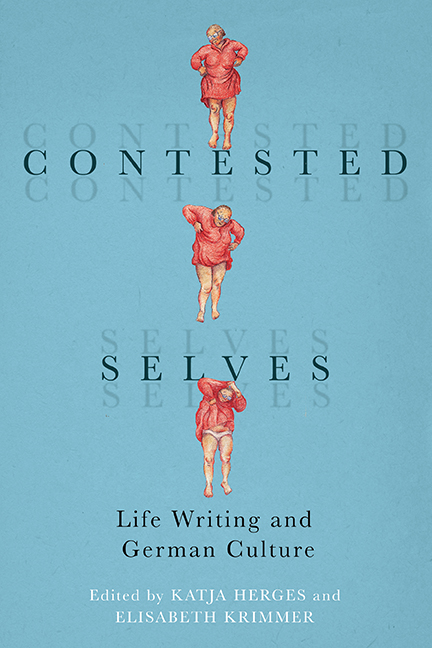Book contents
- Frontmatter
- Contents
- Acknowledgments
- Introduction
- Part I Women’s Life Writing, Female Subjectivity and Agency
- Part II Modern Life Writing and Aesthetics
- Part III Trauma and Vergangenheitsbewältigung
- Part IV Transnational and Transgenerational Life Writing in Contemporary Germany
- Bibliography
- Notes on the Contributors
- Index
Introduction
Published online by Cambridge University Press: 26 May 2022
- Frontmatter
- Contents
- Acknowledgments
- Introduction
- Part I Women’s Life Writing, Female Subjectivity and Agency
- Part II Modern Life Writing and Aesthetics
- Part III Trauma and Vergangenheitsbewältigung
- Part IV Transnational and Transgenerational Life Writing in Contemporary Germany
- Bibliography
- Notes on the Contributors
- Index
Summary
FROM HAPE KERKELING'S Ich bin dann mal weg: Meine Reise auf dem Jakobsweg (2006; I’m Off Then: Losing and Finding Myself on the Camino de Santiago, 2009) to Marcel Reich-Ranicki's Mein Leben (My Life, 1999; in English as The Author of Himself: The Life of Marcel Reich- Ranicki, 1999), from Gregor Gysi's Ein Leben ist zu wenig (One Life Is Not Enough, 2017) to Benjamin Stuckrad-Barre's Panikherz (Panic Heart, 2016), from Walter Kohl's Leben oder gelebt werden: Schritte auf dem Weg zur Versöhnung (Living or Being Lived: Steps on the Path toward Reconciliation, 2011) to Helmut Schmidt's Was ich noch sagen wollte (What I Wanted to Say, 2015), and from Christine Westermann's Da geht noch was (Something Else Is Possible, 2013) to Margot Käßmann's Sehnsucht nach dem Leben (Longing for Life, 2011), memoirs are overrepresented in the ranks of German best sellers. This outsized success of the genre is not only a German but also an international trend. According to Nielsen BookScan, the total sales in memoirs saw an increase of over 400 percent between 2004 and 2008. In 2020, memoirs held the first place among the five top-selling categories on Amazon.com. In some cases, the strong public preference for memoir over fiction has even led authors to refashion projects that were initially conceived as novels into memoirs. But the dominance of the genre of memoir is not just numerical. Ben Yagoda suggests that the “memoir has become the central form of the culture: not only the way stories are told, but the way arguments are put forth, products and properties marketed, ideas floated, acts justified, reputations constructed or salvaged.” It would appear that our hunger for the life narratives of others is equaled only by our desire to transform our own lives into coherent and meaningful stories. It is this process of meaning-making that stands at the center of the present volume, which offers analyses of the various genres of life writing, including memoir, autobiography, autofiction, graphic memoir, diary, and the letter. All essays in this collection explore the cultural, emotional, and political work accomplished by the genres of life writing. They investigate how we make sense of individual experiences by situating them in the larger contexts of families, generations, ethnicities, and nations.
- Type
- Chapter
- Information
- Contested SelvesLife Writing and German Culture, pp. 1 - 30Publisher: Boydell & BrewerPrint publication year: 2021



